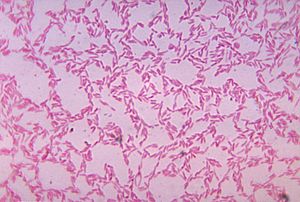Bacteroidetes facts for kids
Quick facts for kids Bacteroidetes |
|
|---|---|
 |
|
| Bacteroides biacutis | |
| Scientific classification | |
| Domain: | |
| Phylum: |
Bacteroidetes
|
| Classes | |
|
|
Bacteroidetes are a group of tiny living things called bacteria. They are found almost everywhere! You can find them in the soil, in the ocean, and even inside animals, including humans. They are especially common in our guts and on our skin.
These bacteria are divided into three main groups, or "classes." Most of the time, Bacteroidetes are helpful or harmless. However, some types, especially those from the group called Bacteroides, can sometimes cause problems if they get into the wrong place, like if you have an injury or a weakened immune system. When this happens, they are called "opportunistic pathogens" because they take advantage of a chance to cause an infection.
Contents
What are Bacteroidetes?
Bacteroidetes are a large group of bacteria. They are known for being very common in many different places. They are a type of Gram-negative bacteria, which means they have a special cell wall that doesn't hold a certain stain in a lab test. This helps scientists identify them.
Where do Bacteroidetes live?
Bacteroidetes are found all over the world. They live in many different environments:
- Soil: They help break down dead plants and other materials in the soil.
- Water: You can find them in both fresh water and salty ocean water.
- Animals: They live inside and on the bodies of many animals, including humans.
Bacteroidetes in your body
In humans, Bacteroidetes are a very important part of the microbiome. This is the community of tiny living things that live inside and on us. Most Bacteroidetes in our bodies live in our large intestine. They help us digest food, especially complex carbohydrates that our own bodies can't break down. They also help train our immune system and protect us from harmful bacteria.
Are Bacteroidetes harmful?
Most Bacteroidetes are not harmful. In fact, many are very helpful! For example, the ones in your gut play a big role in your digestion and overall health.
However, some types can cause problems if they get into parts of the body where they don't usually belong. For instance, if Bacteroides bacteria from the gut get into the bloodstream after an injury or surgery, they can cause infections. This is why they are called "opportunistic." They usually only cause trouble when they get an "opportunity" to do so.
See also
 In Spanish: Bacteroidetes para niños
In Spanish: Bacteroidetes para niños
 | Victor J. Glover |
 | Yvonne Cagle |
 | Jeanette Epps |
 | Bernard A. Harris Jr. |

